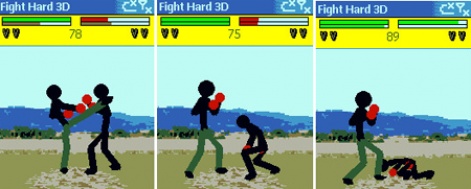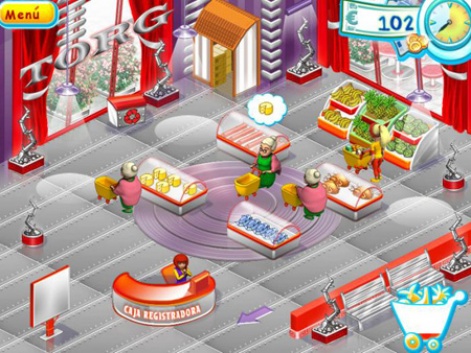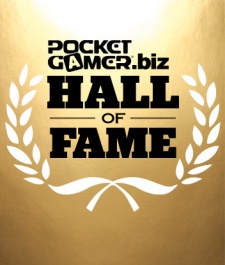Born in 1977, Vlad Suglobov graduated from Lomonosov Moscow State University with M.Sc. in Mathematics and Computer Science.
He worked for a number of Russian and US companies in the games and IT industries, before co-founding G5 Entertainment in 2001 as CEO, a position he still holds.
He's been active in many aspects of G5's growth, from establishing the company's strategy to client relations, product development and sales. Today, Vlad concentrates on expanding G5's business internationally.

Pocket Gamer: What were your favourite games as a kid?
Vlad Suglobov: On ZX Spectrum, my favourites were Elite and Eagle's Nest. That was really long ago.
On PC, I played a lot of id platform games - Dangerous Dave, Commander Keen - I think I played all the games in the Commander Keen series.
I was excited by the graphics and smooth EGA scrolling and enjoyed games like Golden Axe, because of graphics and animation and the second Prince of Persia for the same reason. I really liked the first two Dune games, and spent a lot of time in Sim City, and in terms of simulators Gunship 2000 was my long-time favourite.

And then there were games like Wolfenstein 3D and Wolfenstein: Spear of Destiny. For a long time I played everything the id guys released - Doom I and Doom II, Heretic, Hexen etc... but by then I no longer qualified as a kid.
When did you realise you wanted to make games as a career?
I was a very bored kid until I discovered computers. Then I wanted to make games. When I first got hold of a computer in a computer class, I brought in a game that I'd written on a piece of paper in BASIC (which I learnt from a book). It was a variation of Snake. I think I was around 11, although that game never worked.
After they realised how stubborn I was, my parents practiced 'do what you want'-style of parenting so for a few years I was doing nothing but playing games, trying to make my own games, and watching movies.
I was around 15 when they asked: "So who do you want to be?", and I said 'I'm not going to do anything other than making games'. Since then, I've had to become more open-minded about other activities, but I still enjoy life the most when it's about games.
What was your first role in the industry?
My first job was as a programmer at one of the very first game development studios in Moscow, in the mid-1990s.
It was my freshman year when I got a job, and a dream that came true. It was the first time ever I was paid for programming, and I was paid for making games, which I did anyway.
What do you consider your first significant success?
G5 Entertainment's first downloadable mobile game was released in 2003 on Verizon Wireless's Get It Now service in US. It was called Fight Hard 3D, and was a stick figure fighting game, and one of the very first 3D mobile games made.

Of course, it was very simple 3D but we had invested more than $50,000 developing it, which was quite a lot for a mobile game back then. So we were very happy to see it break even and make money very fast.
When did the potential for mobile games become apparent to you?
I guess it was right after our first success. By then PC games were way too complex. Computers could do anything already so there was not much you could do without a big budget and a large team.
G5 made the first ever The Simpsons mobile game for EA back in 2006.
Mobile games were more like the games I played as a kid and enjoyed. They had the novelty, coolness and excitement of early PC games. And while we were still struggling to get traction in PC games, we were suddenly making mobile games for EA and Disney, who got interested in our isometric graphics engine for mobile phones.
G5 made the first ever The Simpsons mobile game for EA back in 2006. I like to think EA used that game as an inspiration for the look of The Simpsons: Tapped Out. We made quite a few games based on movie and videogame licenses in 2005-2008 - The Sims and Pirates of the Caribbean among them.
We listed G5 Entertainment in Stockholm in 2006 on the story of the potential of the mobile games market.
What do you think is the most significant event in mobile gaming to-date?
To me, it's the introduction of the Apple App Store.
In 2008 we were looking for ways to earn money from original games, which was pretty much impossible on feature phones. We had a few PC casual games that were doing well, so when the App Store became available, we wanted to have an iPhone run something that people would usually see on PC.

So we took our PC casual games, starting with Supermarket Mania, and ported it to iPhone, without losing quality, performance or anything along the way. It looked great, and made more than a million dollars after store fees. Then we did the same with the rest of our portfolio and once we ran out of our own games, we reached out to fellow developers to speed things up. Suddenly G5 was a publisher, sourcing games from over 50 development partners.
To-date, what are you most proud of? Any regrets?
I'm proud of the success of G5's publishing model, and that we were able to bring developers together and make a great business out of it - for them and for us.
I think there's a great synergy that we unleashed between the creativeness of these independent studios in central and eastern Europe and our vision, direction, and knowledge of the market. Our experience of struggling as a developer many years ago made me want to make G5 the kind of publisher we ourselves would have been happy to work with.
We have also built a great internal development studio responsible for Supermarket Mania, Virtual City and its free-to-play version, and other games. These are great games; all have made great business for G5. And we have even better ones coming to the market soon.
I don't have many regrets. We did what we could, given what we started with. Perhaps we did not need to spend so much time trying to break into PC games in mid-2000s. The lesson is you need to focus on what's working and has the biggest growth potential.
Which mobile games have you most enjoyed recently and why?
G5 Entertainment was releasing so many games for a few years that I did not have much time to look around. Of our games, I love playing The Secret Society, The Island Castaway series, our own Virtual City, Supermarket Mania - I really enjoy these games.
The only substantial time I've spent playing other developers' games was spent on Puzzle & Dragons. I like the simplicity yet the depth of the core match-3 mechanic; I haven't seen it in other match-3 games. It looks like just another match-3 game, but it depends a lot more on your skill rather than luck. And the combat and managing your monsters makes even more sense of it.
What are your predictions for the new big development in mobile games?
It's difficult to predict what the next overnight success bird game is going to be! What looks certain is that sooner or later this will fade away, too.
I think there's a trend towards deeper and more engaging gameplay experiences on mobile.
When Pocket Gamer asked me back in 2009 about where the prices for apps are heading, I was one of the very few who said they are heading up. And the prices of our premium games have risen from $0.99-$1.99 in 2009 to $4.99-$6.99 now, and our revenue per user in free-to-play games is going up steadily too.
So we try to focus on more sustainable games and game portfolios, targeted at slightly more niche but still large audiences, with higher revenue per loyal player. For example, we have disproportionally more female players.
I also think there's a trend towards deeper and more engaging gameplay experiences on mobile. You have to start off casual with simple and intuitive experiences, but gradually provide more depth and content to keep the player engaged for a long time.
In which area of the industry do you hope to make a difference in future?
I feel very good in mobile and, for obvious reasons, I think there's still a lot of growth potential. Having direct access and connection to millions of players around the world has been very rewarding psychologically for me.
You get to see how players go through the game, react to the updates and changes, leave comments in real-time: there's a big sense of demand for what you do, and the presence of end users in your everyday work.
Starting out in simple monochrome in the days of Snake and WAP, the past decade has seen the mobile games industry kaleidoscope into a glorious, multi-billion dollar sector that's driving global innovation.
So it's high time we celebrate some of the people who helped make that journey possible - something PocketGamer.biz will be doing in its regular Hall of Fame interviews.
You can read our previous articles here.























